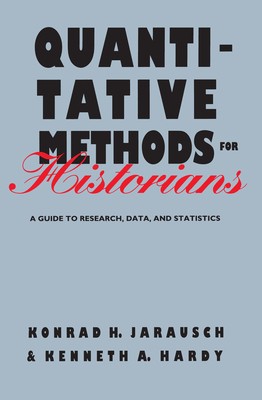
- We will send in 10–14 business days.
- Author: Konrad H Jarausch
- Publisher: University of North Carolina Press
- ISBN-10: 0807843091
- ISBN-13: 9780807843093
- Format: 15.2 x 23 x 2 cm, softcover
- Language: English
- SAVE -10% with code: EXTRA
Reviews
Description
The pioneering texts in quantitative history were written over two decades ago, but as a command of methodological context, computer experience, and statistical literacy have become increasingly important to the study of history, the need for an introductory text addressing these matters has increased. Quantitative Methods for Historians is a theoretical and practical guide for the application of quantitative analysis in historical research. It is designed for students of history and related disciplines who are curious about the possibilities of quantification and want to learn more about its recent development.
Integrating the use of the statistical packages SAS and SPSS with the quantitative method, the authors discuss techniques for defining a problem, proceed to the building of a data set and the use of statistical methods, and conclude with the interpretation of results. The data set section concentrates on the basics of formalized research, discussing the coding process and the more complicated problems of data transformation and linkage. The statistical parts systematically build upon traditional fundamentals and introduce new analytical techniques for qualitative variables.
Intended as a working introduction to quantitative methods, this guide also provides additional information on advanced statistical techniques and discusses questions of historical computing, reflecting critically on the proper role of quantitative methods.
EXTRA 10 % discount with code: EXTRA
The promotion ends in 18d.07:57:59
The discount code is valid when purchasing from 10 €. Discounts do not stack.
- Author: Konrad H Jarausch
- Publisher: University of North Carolina Press
- ISBN-10: 0807843091
- ISBN-13: 9780807843093
- Format: 15.2 x 23 x 2 cm, softcover
- Language: English English
The pioneering texts in quantitative history were written over two decades ago, but as a command of methodological context, computer experience, and statistical literacy have become increasingly important to the study of history, the need for an introductory text addressing these matters has increased. Quantitative Methods for Historians is a theoretical and practical guide for the application of quantitative analysis in historical research. It is designed for students of history and related disciplines who are curious about the possibilities of quantification and want to learn more about its recent development.
Integrating the use of the statistical packages SAS and SPSS with the quantitative method, the authors discuss techniques for defining a problem, proceed to the building of a data set and the use of statistical methods, and conclude with the interpretation of results. The data set section concentrates on the basics of formalized research, discussing the coding process and the more complicated problems of data transformation and linkage. The statistical parts systematically build upon traditional fundamentals and introduce new analytical techniques for qualitative variables.
Intended as a working introduction to quantitative methods, this guide also provides additional information on advanced statistical techniques and discusses questions of historical computing, reflecting critically on the proper role of quantitative methods.


Reviews